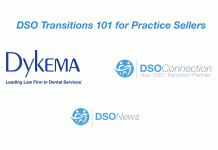A lot of dentists are
According to an American Medical Association study, 2016 was the first year that less than half of physicians had an ownership stake in their practice. In fact, only 47.1% of physicians had an
The main drive towards consolidation? Health systems were buying up physician practices to implement an integrated care model. According to the same survey, corporate growth in medicine has slowed slightly, however that is only because health systems generally feel that they already have as many practices as they can reasonably manage.
To compare, although solid numbers are difficult to ascertain, the general consensus seems to be that roughly 16% to 20% of the dental industry has consolidated.
Dermatology, Ophthalmology, and Other Specialties
According to The Dermatologist, consolidation remains strong in dermatology. Private equity has gotten a foothold here as well. Out of 200 private equity medical transactions between 2014 and 2016, 30 were for dermatology practices. 42% of dermatology patients are over the age 60, the DHHS expects this number to continue increasing until 2020. What was a $7.5B industry in 2015 is expected to increase to $8.6B in 2020, making it attractive to private equity firms.
Like dental, ophthalmology is moving rapidly towards consolidation. It is considered ripe for private equity firms due to how segmented the industry is. The ophthalmology market enjoys good demographic trends, increasing demand of services due to an aging population and has multiple avenues to additional growth.
If you go to the emergency room, you may be seen by an emergency physician who has no equity participation in their practice. The same is true for many anesthesiologists when you have surgery.
In each specialty, the groups are structured in ways that are very common to the DSO model.
Not Limited to Dentists and Physicians
According to a March 2018 survey by Packaged Facts, a division of MarketResearch.com, consolidation is going strong in veterinary care, too. Mars, Inc. (yes, the candy maker) is one of the biggest players and has bought up the largest veterinary hospitals such as VCA, Banfield, BluePearl and Pet Partners. They are also acquiring a new diagnostics company.
Additional players include PetSmart, Petco
* * *
The lesson? Love it or hate it, dental consolidation is here to stay. As the dental industry continues to consolidate, independent practices will find it more difficult to compete. Due to economies of scale, a large corporate managed group is able to achieve more for less. This is true for everything from lab and supply bills, revenue cycle management, access to better employee benefits and much more.
If you’re an independent or small group owner you will eventually have to face consolidation head on. The offers will come in for your practice. If you are looking to get out, the most difficult choice is “when.” Multiples on transactions where the buyer is DSO or large group are currently quite attractive. Will they become more attractive as consolidation accelerates? Only time will tell. Timing is everything.











